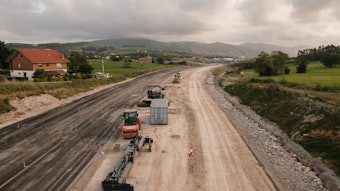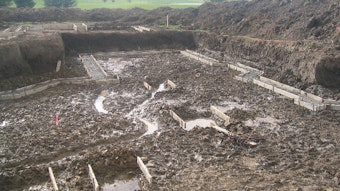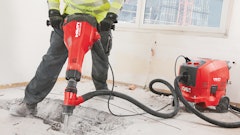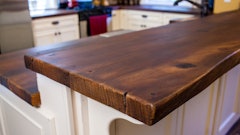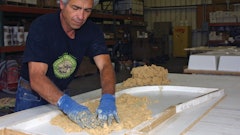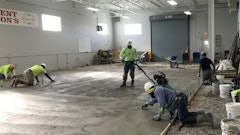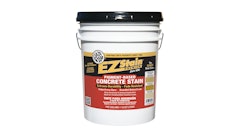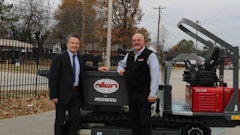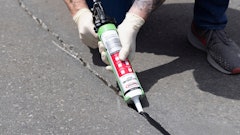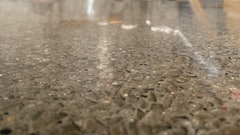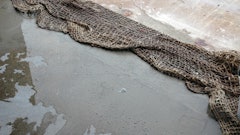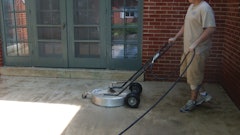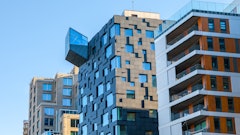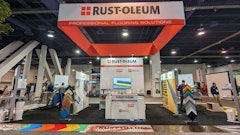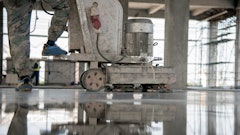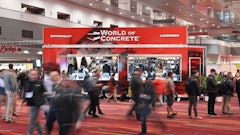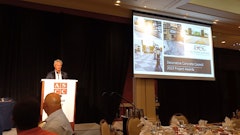
The leading edge of design will always be in the distance, a constant challenge most in the building industry find compelling. Designers want to innovate because their clients expect a wow factor in the finished product. Builders must make it happen, stretching to find subcontractors with the precise knowledge, skill, and equipment required to deliver whatever the leading-edge innovation is. For both designers and builders, keeping up with the curve is critical. When it comes to high-performance, indoor/outdoor, hard surfaces, Bomanite® is the most recognized name in architectural concrete.
“Architects are often looking for something new or unique, an answer to a problem. That’s where we excel,” says Terry Grimble, Director of Technical Services for The Bomanite Company. With a 70-year history, Bomanite is recognized as the inventor of stamped concrete, exclusively establishing the techniques and market for high-performance, imprinted, decorative, and ornamental concrete in the 1950’s. Today, Bomanite products are being installed independently by Licensed Contractors all over the U.S. on commercial and residential projects of every scope and scale. Bomanite’s collective knowledge and resources are available to each of the 50 independent contractors across the country when challenges arise and technical or logistical expertise is required.
When Texas Christian University renovated their football stadium the design objective for Founder’s Plaza was to emulate a map view of Fort Worth, Texas including city streets, railroad tracks, and the Trinity River. After offering design assistance in planning 40,000 sq. ft. of highly decorative exterior walkways around the stadium, Texas Bomanite completed the installation of multiple finishes, with logos, lights, and letters imbedded throughout. Being able to draw upon the collective knowledge of the Bomanite Company and 49 other colleague contractors working with Bomanite products is always an asset.
“Our goal is to be able to economically recreate all of the finishes we develop on a much larger scale, in a way that can be installed using tools and equipment common to the industry at generally any place in the U.S.,” says Grimble. In addition to establishing the chemical compositions and installation techniques for products, Bomanite also produces technical details and product samples that can be shared with architects for specification, and marketing materials for licensees.
The increased desire for public wet-play surfaces like those found in water parks has also contributed to the growing range of decorative concrete products offered today. At the Tandy Family YMCA in Tulsa, Oklahoma, designers GH2 Architects introduced a dynamic splash pad at the main entrance as a public amenity. With any wet play surface, hardscape materials need to account for a coefficient of friction to make them safe for energetic, bare foot play on a hot summer day. Bomanite Sandscape is ideal, combining locally sourced aggregates, colored sands, and custom glass to create a granulated surface texture speckled with shiny glass jewels. GH2 and the Y’s leadership selected a combination of Bomanite Revealed (Custom Blue Glass) and Bomanite Sandscape Texture (Gobi Desert Integral Color) techniques.
“This project called for high-impact, aesthetically pleasing, and long-lasting architectural concrete,” says Jeremy Carlisle, Associate Principal with GH2 Architects. “Perhaps just as importantly, we needed it to be installed by a team with the technical knowledge to tackle a very challenging configuration and complex coordination.”
Bomanite takes pride in the meticulous development of compositions and finishing processes that can be readily installed in the field. With practicality for the builder, durability for the product, and high-quality for the owner all in mind, Bomanite goes through as many as 50 iterations before finalizing the technical details of laying a new type of concrete surface. An example of a newer product, the Bomanite Antico process is used to create fissures, voids, and other random effects simulating a semi-worn stone surface comparable to natural pitted limestone or a travertine tile.
When the Northside Church in Clovis, California decided to reinvent the plaza space in front of the church as a dynamic new baptismal center, their primary goal was to create a place where people feel welcome and connected. There, designers selected a combination of the Bomanite Sandscape Refined Antico finish in Bomanite Light Brown and three integral colors in a Bomanite Sandscape finish to get the cohesive yet varied look they wanted.
“Decorative concrete is wonderfully flexible in terms of being able to create virtually any combination of color and texture and shape imaginable at a reasonable cost,” says Terry Broussard, Principal with Broussard Associates, who led landscape architecture services for the redeveloped space in front of the church. “Bomanite’s products are a very viable solution for public spaces where design matters and ordinary broom finished concrete isn’t going to feel special.”
Samples are a critical component of the product specification process taking place in design studios across the country, and decorative concrete finds no exception for either size or complexity.
“Concrete isn’t paint,” says Grimble with a smile. “There are a lot of variables, from the selected aggregate’s specific gravity and color influences to the ready-mix producer’s material composition.” Standardized and custom three-inch square chips developed in Bomanite’s Denver, Colo. laboratory allow architects, owners, and contractors to hold the real thing on a smaller scale, demonstrating clearly that design intent is understood. “These samples are basically a business card and we are heavily invested in controlling quality and confidence in the finished project. They are far more accurate than a color chart or product photograph could ever be.”
While the edge of design will always be elusive, innovation is constant and Bomanite allows the building industry to continually increase their wow factor expectations.
